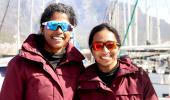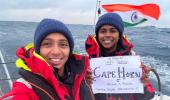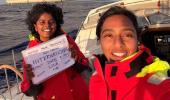What tasks they accomplished, how they stayed fit, what did they eat, whom did they meet, what they brought back... amazing stories from an epic voyage.

When Lieutenant Commanders Dilna K and Roopa A entered Indian waters after sailing around the world for 8 months, they were given a hero's welcome by an Indian naval aircraft.
And deservedly so because they are among the world's best sailors. Only 8 other Indians before them have circumnavigated the globe.
Imagine that.
The two naval officers encountered rough seas and fair winds; they spotted rare celestial events, collected invaluable marine data and sailed to the remotest parts of the earth.
They also battled serious emergencies like when the GPS, wind indicator, autopilot -- everything went off on the boat in the middle of the night in the Pacific.
"It happened just before a storm which made it even more dangerous. We didn't have much time and dropped the sails and set to work. We found out what was wrong, rectified it and sailed on," the two ace sailors recount the journey, including what they ate, how they stayed fit and what mementoes they brought back to Rediff's Archana Masih.
- Part 1 of the Interview: 'The Boat Was Rocking Like A Washing Machine'
How did the boat perform during the journey? There was a time when all the systems had blacked out on the boat. How did you save the day?
Lt Cdr Dilna: During our training period, Commander Abhilash Tomy had prepared us for all sorts of emergencies. This included navigation and electrical blackout.
When such emergencies happen in the middle of the Pacific, it is very difficult for help to reach you and could take around three-four days.
The blackout happened in the night before an approaching storm which made it even more dangerous. We didn't have much time and had to things quickly.
The GPS, wind indicator, autopilot -- everything went off.
It felt like we were lost at sea.
Then we dropped all the sails and set to work. We found out what was wrong, rectified it and sailed on.
What tasks did you accomplish and what samples of marine life did you bring back for further investigation?
Lt Cdr Dilna: We collected 60 water samples from around the world, especially for the National Institute of Oceanography. The access to the Southern Ocean is limited, so we were able to collect samples from that region, the three great capes and Point Nemo.
We also collected data about marine life like whales, dolphins, various birds in different latitudes for the Wildlife Institution of India.
We were journaling every day and took photographs and videos to the Indian Navy. A coffee table book on the voyage was released on the day of the flag in.
We were able to record most of the journey even when the weather was bad.

What was your reaction when you entered Indian waters after 8 months?
Was it a mix of happiness and sadness that your journey is coming towards an end?
Lt Cdr Roopa: It was a mix of both.
The eight months seemed to have flown past, but the experience will remain with us.
Definitely, there are some changes -- both physical and in our perspectives, but it was a huge relief coming back to our home waters.
We were pleasantly welcomed by our Indian naval aircraft. It was a very happy moment for us.
What are some of the mementos that you all have brought back with you from your travels?
Lt Cdr Roopa" We've collected shells and stones from each of the beaches -- and sand from the Falklands.
We were presented with mementos and various gifts from the lovely people in the ports. In New Zealand, we were welcomed by the Maoris who gifted us a woven mat. It is a very special gift.
We also received a book on the Antarctic explorer Ernest Shackleton from the CEO of Antarctic Explorations in New Zealand.
We posted postcards from each of the countries to friends and to ourselves, just a written message with the date. We've not received most of them yet, and are hoping to receive them.
We bought fridge magnets for friends and families.

What did you cook and eat on the boat?
Lt Cdr Dilna: We ate twice a day.
It was usually cornflakes and omelette for breakfast, till the time eggs were available. Then there were tinned beans and vegetables.
We had dinner before sunset between five and six. Dinner was the major meal -- like rice or dal. There were chapatis which we could heat and eat.
The Defence Food Research Laboratory of India had prepared ready to eat meals which included some Indian food. We ate that when the weather was bad.
Fresh food was loaded at each port. We ate that for about a week because there was no fridge on the boat.
[Since the boat had to be kept light only essential articles were carried onboard.]
When we the stock of fresh food like fruits, vegetables was over, we relied on tinned food.
We also took supplements.
Sailing is very physically demanding. How did you look after your health and fitness on the boat?
Lt Cdr Dilna: Activities on the boat are physically tiring and help us keep fit. However, since the boat is only 17 metres long, the lower body tends to get weak and upper body became more strong because we are handling sails that weigh 100 kgs.
We tried to maintain a balance by doing specific exercises and mediation whenever the weather permitted.
We didn't face any major health issues or get sick because we were in a sterile environment at sea. There were some minor injuries, but we were both well trained in first aid.
We suffered some muscle loss and lost 5-7 kgs during the journey.
The Indian Navy had a doctor available 24/7 for any assistance at any point of time. A board of officers had been put in place to help us.

What about sleep? Did you get a full night's sleep on the boat?
Lt Cdr Roopa: There were days when we barely got an hour's sleep when the weather was rough, but in regions like the Equator, part of the Doldrums, and in the areas where we didn't get any winds, there were times we dropped all our sails and caught some sleep.
This usually happened after a storm had passed and there would be a lull.
We took that opportunity to recuperate and do some maintenance on the boat as well.
How did you stay in touch with your family when you were away from the ship?
Lt Cdr Dilna: We had a satellite facility for communication with the Indian Navy. We were required to send reports every 12 hours. We used the same facility to be in touch with our families.
How did you divide chores?
Lt Cdr Roopa: After years of sailing together, we know each of our strengths and weaknesses. We have come into a rhythm, for example, whoever is hungry, will cook first.
We both are in that frequency where we know what is to be done.
Photographs curated by Manisha Kotian/Rediff
Feature Presentation: Aslam Hunani/Rediff










